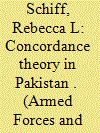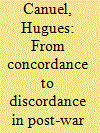|
|
|
Sort Order |
|
|
|
Items / Page
|
|
|
|
|
|
|
| Srl | Item |
| 1 |
ID:
143288


|
|
|
|
|
| Summary/Abstract |
In Zulfiqar Ali’s article regarding concordance theory in Pakistan, Dr. Ali asserts that concordance theory does not explain domestic military intervention in Pakistan. He also suggests that concordance theory superimposes a Western theoretical model on Pakistan, like Huntington’s theory of objective civilian control. In response to Dr. Ali’s claims, this article reiterates how concordance theory can in fact explain why Pakistan has suffered from domestic military intervention—the alienation of the Bengali community and subsequent lack of agreement among the three concordance partners being one significant factor. Additionally, Huntington’s theory focuses on institutional and dichotomous civil–military relations, grounded in the post–World War II US case study. By contrast, concordance theory views the relationship between military and society from both cultural and institutional perspectives and embraces those indigenous qualities that may encourage or discourage domestic military intervention.
|
|
|
|
|
|
|
|
|
|
|
|
|
|
|
|
| 2 |
ID:
112376


|
|
|
|
|
| Publication |
2012.
|
| Summary/Abstract |
This study introduces the new concept of targeted partnership, which encourages robust dialogue between military officers and policy makers to create and implement effective military strategy such as counterinsurgency. Targeted partnership is a distillate form of concordance theory or agreement involving reciprocity between the military, political elites, and society for a limited period of time to accomplish a very specific objective. Targeted partnership may involve the temporary co-mingling of military, political, and societal boundaries even when the broader institutional and cultural relationship between military and society may be one of separation. In other words, separation and integration may exist at the same time for very specific reasons central to a nation's foreign policy. Targeted partnership is a practical extension of concordance theory that enables the military to have effective interactive dialogue with policy makers to explore critical military strategies, such as counterinsurgency, while considering the cultural and institutional contexts of foreign nations.
|
|
|
|
|
|
|
|
|
|
|
|
|
|
|
|
| 3 |
ID:
128243


|
|
|
|
|
| Publication |
2013.
|
| Summary/Abstract |
It was a remarkable sight, on this sunny day of 26 August 1944: the patrician figure of Charles de Gaulle leading the victory parade down the Champs-Élysées following the evacuation of the French capital by the German occupier.1 The triumphal march under the acclaims of the Paris citizenry was symbolic of the dominant position the general had assumed in the Gouvernement provisoire de la République française. As provisional head of state and the dominant military figure in France, he was in a position of unprecedented power for a French army officer, at least since Napoleon Bonaparte had proclaimed himself First Consul in 1799. De Gaulle indeed held near-dictatorial powers as he set about rebuilding France at home and restoring control over her colonial empire. Nevertheless, he would resign less than two years later when faced with fierce opposition by established political figures disagreeing with his proposed constitution for a new republic.
Thus created in 1946 through the peaceful transfer of power from a quasi military supremo to a legitimately elected government, only to come to an ignominious end in 1958 under the threat of a military coup during the darkest days of the Algerian War of Independence, the short-lived French Fourth Republic experienced the full spectrum of civil-military relations (CMR). This episode provides a dramatic test case to measure the validity of any given CMR theory as it encompassed such a wide range of well-documented events focused on the very essence of the problematic, explaining civil society's relationship with the military organization established to protect it.2 One such theory seeks to measure a fundamental element of that equation, trying to answer the challenging question of '[w]hy will a military intervene in its own nation's system of government' by outlining the 'conditions [that] promote or inhibit domestic military intervention'.3 Scholar Rebecca Schiff proposed such a model nearly two decades ago, seeking to alleviate the alleged shortcomings of more established theories largely derived from the experience of the United States and often limited to arguments concerned with the separation of civil and military institutions.4
She posited instead that her theory of concordance 'considers the unique historical and cultural experiences of nations' and 'moves beyond institutional analysis by addressing issues relevant to a nation's culture'.5 This paper seeks to measure the validity of such a premise through the study of civil-military relations under the French Fourth Republic. This approach will require the reader initially to understand the evolution of CMR in France through the trauma of military defeat in 1940 and the rise of de Gaulle as well as the circumstances that led to the instauration of the Fourth Republic. It will then become necessary to evaluate the influence of successive challenges overseas, first in Indochina and then in Algeria, to establish the legitimacy of the concordance theory as civil-military relations came to a nadir in France. First, though, one must clearly comprehend the foundations of Schiff's theory in order to adequately judge its validity through the proposed case study.
|
|
|
|
|
|
|
|
|
|
|
|
|
|
|
|
|
|
|
|
|